Michele Huey's Blog: God, Me, and a Cup of Tea, page 55
July 13, 2015
Finding the Thanks
Be joyful always; pray continually; give thanks in all circumstances, for this is God’s will for you in Christ Jesus. – 1 Thessalonians 5:16–18 (NIV)

Image courtesy of patpitchaya at DigitalPhotos.net
I stared at the numbers. The “out” figure was significantly higher than the “in.” Paying only a portion was not an option. The bills were to be paid in full, the due dates firm.
“Show me how to do this, Lord,” I whispered, pushing back the worry nudging at my heart.
And He did. It wasn’t the way I’d wanted—taking the money from a meager investment account we use for emergencies. But when God gives the answer, I’ve learned to follow His advice.
It looks as though I’m going to be asking His advice more, because this year our budget is being hit hard. We’ve had to replace our 35-year-old water pressure tank, the washer (although it was only 16 years old) and my husband’s eyeglasses, all within two months after we breathed a sigh of relief for paying the taxes on time.
Looming just ahead are a deposit on a new hearing aid for me (I won’t even tell you how old the one I have is), the bi-annual car insurance payment and a doubled property tax bill (stirring up the hornet’s nest here). Add to the list higher copays and health insurance deductibles.
But it is what it is. So I’m back to praying, “Lord, show me how to do this.”
There was a time when I prayed for God to send the money. I expected Him to drop it in our laps. It didn’t happen. Not that He doesn’t keep His word to provide for all our needs (Philippians 4:19), to hear us when we call on Him (Jeremiah 33:3), to answer when we ask, seek and knock (Matthew 7:7–11). He just knew I had greater needs than instant money.
I needed to learn to live within our means. I needed to apply the words “frugal,” “resourceful” and “wise.” I needed to learn the difference between “needs” and “wants.” It took me a while, but I needed to learn how to pray—not “Send me the money (like, NOW)” but “Show me how to do this.” And I needed to learn to find the thanks.
When we’re getting slammed with the unexpected, the unwanted, it’s human nature to cry, “Unfair!” or “Why me?” and to complain, argue and wrestle with (and sometimes feed) a bad attitude.
Changing our attitude involves a change in our thinking from “poor me” to “rich me.” We have a Father who provides for all of our needs out of His riches—His glorious riches.
What am I thankful for in this time when the month is longer than the money?
I’m thankful the water tank lasted as long as it did, the washer needed only one repair during those 16 years, and when they did need replaced, we had the money to pay for them—hubby’s first Social Security check.
And I’m thankful for a Father in Heaven who will show me how to meet those upcoming bills, who provides for all my needs, and who’s teaching me to find the thanks.
When the stuff of life gets overwhelming, Lord, help me to find the thanks. Amen.
MORE TEA: Read Philippians 4:4–9


July 11, 2015
Finding the thanks
 Image courtesy of patpitchaya at DigitalPhotos.net
Image courtesy of patpitchaya at DigitalPhotos.netBe joyful always; pray continually; give thanks in all circumstances, for this is God’s will for you in Christ Jesus. – 1 Thessalonians 5:16–18 (NIV)
I stared at the numbers. The “out” figure was significantly higher than the “in.” Paying only a portion was not an option. The bills were to be paid in full, the due dates firm.
“Show me how to do this, Lord,” I whispered, pushing back the worry nudging at my heart.
And He did. It wasn’t the way I’d wanted—taking the money from a meager investment account we have for emergencies. But when God gives the answer, I’ve learned to follow His advice.
It looks as though I’m going to be asking His advice more, because this year our budget is being hit hard.
We’ve had to replace our 35-year-old water pressure tank, the washer (although it was only 16 years old), and my husband’s eyeglasses, all within two months after we breathed a sigh of relief for paying the taxes on time.
Looming just ahead are a deposit on a new hearing aid for me (I won’t even tell you how old the one I have is), the bi-annual car insurance payment, and a doubled property tax bill. Add to the list higher copays and health insurance deductibles.
But it is what it is.
So I’m back to praying, “Lord, show me how to do this.”
There was a time when I prayed for God to send the money. I expected Him to drop it in our laps.
It didn’t happen. Not that He doesn’t keep His word to provide for all our needs (Philippians 4:19), to hear us when we call on Him (Jeremiah 33:3), to answer when we ask, seek, and knock (Matthew 7:7–11).
He just knew I had greater needs than instant money.
I needed to learn to live within our means. I needed to apply the words “frugal,” “resourceful,” and “wise.” I needed to learn the difference between “needs” and “wants.” It took me a while, but I needed to learn how to pray—not “Send me the money (like, NOW)” but “Show me how to do this.”
And I needed to learn to find the thanks.
When we’re getting slammed with the unexpected, the unwanted, it’s human nature to cry, “Unfair!” or “Why me?” and to complain, argue, and wrestle with (and sometimes feed) a bad attitude.
Changing our attitude involves a change in our thinking from “poor me” to “rich me.” Because we have a Father who provides for all of our needs out of His riches—His glorious riches.
What am I thankful for during this time when the month is longer than the money?
I’m thankful the water tank lasted as long as it did, the washer needed only one repair during those 16 years, and when they did need replaced, we had the money to pay for them—hubby’s first Social Security check.
Now that the gratitude floodgates are open, I can spend all day listing the many, many things for which I'm thankful.
But most important, I’m thankful for a Father in Heaven who will show me how to meet the upcoming bills, who provides for all my needs, and who’s teaching me to find the thanks.
When the stuff of life starts to be overwhelming, Lord, help me to find the thanks. Amen.
More tea: Philippians 4:4–9
July 3, 2015
My Country, 'Tis of Thee

A brass relief of George Washington kneeling in prayer at Federal Hall in New York CityBy OptimumPx (Own work) [Public domain], via Wikimedia Commons
“Hear the supplications of your servant and of your people Israel when they pray toward this place. Hear from heaven, your dwelling place, and when you hear, forgive.” – King Solomon, 2 Chronicles 6:21 (NIV)
Over the 18 years I’ve written my weekly column and then this blog, I’ve avoided controversial topics. I figure you all get enough—more than enough, perhaps—of that elsewhere. My purpose has always been to give hope, to show that faith and life go hand in hand, that God cares intimately for each of us and is with us every moment of every day.
But I’ve had a heavy heart for my country—and it’s getting heavier.
No, I still will not address the hot button topics here, but I will address what I believe our response, as Christians, should be.
First, read, meditate, know, and obey the Word. Let it permeate every fiber of your being. Allow God to use His Word to transform you from the inside out—heart, mind, and soul. “Do not conform to the pattern of this world, but be transformed by the renewing of your mind. Then you will be able to test and approve what God’s will is—His good, pleasing and perfect will” (Romans 12:2).
Next, pray! For revival to sweep the nation, one soul at a time. For the Holy Spirit to ignite the faith of believers and fill our places of worship—and us. For eyes to be opened to the truth, for hearts to be softened to receive the seed of the Word, for strength and courage to be Psalm 1 men and women.
Finally, be salt and light. “You are the salt of the earth,” Jesus said. “But if the salt loses its saltiness, how can it be made salty again? . . . You are the light of the world. . . . Let your light shine before men” (Matthew 5:13–16).
How can you be salt and light? Simple: Live the Word.
And while we must stand up for that which we know is right, we must be careful not to judge other folks.
“Do not judge,” Jesus said, “or you too will be judged. For in the same way you judge others, you too will be judged, and with the measure you use, it will be measured to you” (Matthew 7:1–2).
“For I did not come to judge the world,” Jesus said, “but to save it” (John 12:47). “For God did not send His Son into the world to condemn the world, but to save the world through Him” (John 3:17).
Judgment Day is coming, be sure of that. But until then, remember the words of Billy Graham: “It is the Holy Spirit’s job to convict, God’s job to judge, and my job to love.”
I just keep asking myself, “What would Jesus do?”
May we continue to pray as George Washington did on the inauguration of this country (April 30, 1789):
“Almighty God, we make our earnest prayer that Thou wilt keep the United States in Thy Holy protection; and Thou wilt incline the hearts of the Citizens to cultivate a spirit of subordination and obedience to Government; and entertain a brotherly affection and love for one another and for their fellow Citizens of the United States at large, and particularly for their brethren who have served in the Field.
“And finally that Thou wilt most graciously be pleased to dispose us all to do justice, to love mercy, and to demean ourselves with that Charity, humility, and pacific temper of mind which were the Characteristics of the Divine Author of our blessed Religion, and without a humble imitation of whose example in these things we can never hope to be a happy nation. Grant our supplication, we beseech Thee, through Jesus Christ our Lord. Amen.”
Source for prayer: http://www.propheticroundtable.org/ForeFathers/GeorgeWashington/A%20Prayer.htm
More tea: 2 Chronicles 6:12–42
I've just finished reading The Harbinger and The Harbinger Companion by Jonathan Cahn. I highly recommend both of them.
June 27, 2015
Getting into the game

“I am the gate; whoever enters through Me will be saved.” – Jesus, as quoted in John 10:9 (NIV)
When our son gave us tickets for a Pittsburgh Pirates home game, I got online to see what we could and could not take in. It’s been several years since Dean and I have been to PNC Park, and I wanted to review the rules.
Hubby and I aren’t big spenders, so we rarely purchase concession stand food. Oh, I know it’s part of the ballpark experience, but our wallets can stretch only so far. We usually pack a cooler with a picnic lunch. One time we munched on sandwiches on a grassy, shady spot not far from the ballpark.
A few days before the game, I googled “PNC PARK” and clicked on the information page for food and beverage/gate policy.
A hard-sided cooler is out, but we’re allowed one soft-sided bag each, no larger than 16x16x8 inches. No ice packs or cooler inserts. Sealed, clear water bottles no larger than 24-ounces are allowed, but not carbonated beverages, sports drinks, cans or thermoses. Bags are subject to be checked. No surprises there.
But there is a new policy that semi-surprised me: Every person must go through a metal detector before being allowed in the ballpark. It’s similar to going through the security checkpoint at the airport, except you don’t have to take your jacket, belt and shoes off. And you can keep your wallet, keys and watch. But your cell phone, tablet, laptop and camera must go in a tray as you walk through the detector.
In light of today’s world, this is for the safety and protection of everyone who attends the game.
Someday we’ll all stand at the gate of heaven. We won’t have to worry about taking food in—indeed, all who enter will enjoy a banquet of unimaginable proportions. And we won’t need any of our electronic gadgets. Everything we need for our eternal life will be waiting for us in the dwelling place (some versions use the word “mansion”) Jesus said He’d prepare for us (John 14:2).
Although we won’t have to pass through a device that detects things that aren’t allowed in (see Revelation 21:8; 22:15—in short, sin), we do have to pass through the one and only gate that will allow us in: Jesus Himself.
“I am the gate,” He said. “Whoever enters through Me will be saved” (John 10:9).
“I am the way, the truth, and the life,” He said. “No one comes to the Father except through Me” (John 14:6).
And again: “God has given us eternal life, and this life is in His Son. He who has the Son has life; he who does not have the Son of God does not have life” (1 John 5:11–12).
Walking though the gate of Jesus Christ cleanses us from all the sin that would keep us out of heaven.
Have you passed through the gate? Have you gotten into the game?
Thank you, God, for providing the way into Your home. Amen.
More tea: Read John 10:7–11
June 20, 2015
A Psalm 1 Man
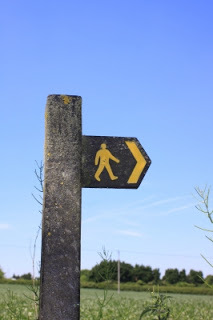 Image courtesy of Simon Howden
Image courtesy of Simon HowdenFreeDigitalPhotos.net
The integrity of the upright will guide them. - Proverbs 11:3 (NKJV)
My father inspected buildings being constructed for the state, making sure the contractors followed the blueprints. Having worked construction himself when he was younger, he knew too well how corners could be cut and a building's integrity undermined. He refused many a contractor's overtures, often gifts of liquor stashed in the back seat of his car. His colleagues soon recognized he could not be bought. He would not allow his personal integrity to be undermined.
The word integrity comes from two Latin words that together mean "untouched, whole, entire." These two Latin roots also give us integrate, which means "to weave or blend separate entities into a working whole or unit."
Personal integrity cannot be put on and off like a garment. Rather it is woven into the moral fabric of our lives over time. We weave it in each time we keep a promise or tell the truth no matter what it costs us, whether it's claiming all our income on our tax return, returning extra change we received by mistake, or paying the difference when we're undercharged. We weave it in each time we admit our mistakes and take responsibility for our words and actions.
My father was a man of integrity - or, as I like to phrase it, a "Psalm 1" man.
What characterizes a Psalm 1 man, a man of integrity?
Two things: what he doesn't do and what he does.
He doesn't walk in the counsel of the ungodly, stand around with sinners, or sit in the seat of mockers (v. 1). Notice the verbs show a progression: walking, standing, sitting.
Walking in Scripture implies a way of life. The Psalm 1 man walks, all right, but he takes the narrow road, often alone (Matthew 7:13-14). He walks by faith, not by sight (2 Corinthians 5:7), and he walks in the light (John 8:12). As a result, the man of integrity walks securely (Proverbs 10:9).
The Psalm 1 man doesn't "stand in the way of sinners." He doesn't hang out with those for whom wickedness is a way of life. He knows that "bad company corrupts good character" (1 Corinthians 15:33). The man of integrity keeps moving, knowing if he walks with the wise he'll become wise, and if he associates with fools, he'll get in trouble (Proverbs 13:20 NLT).
And the Psalm 1 man doesn't "sit in the seat of mockers." Sitting implies settling in and getting comfortable with those who mock God, ridicule Him, and defiantly reject Him. The man of integrity doesn't join in with those who scorn God and His way. Indeed, he stands up for that which is good and true, right and just, noble and holy.
The Psalm 1 man knows God's Word so well it's a part of him, nourishing him and guiding him, causing him to thrive (verses 2-3).
All it takes is one man of integrity to influence the world around him. Be that Psalm 1 man.
May our nation and world be filled with Psalm 1 men. Amen.

More tea: Read Psalm 1
June 13, 2015
Finding the trail
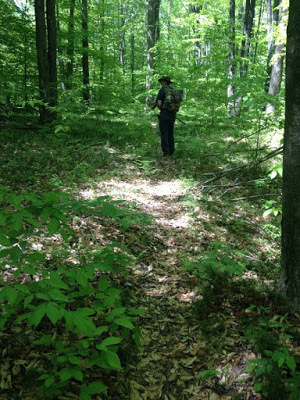 Dean leading the way through the woods
Dean leading the way through the woods on one of our recent hikes.My soul followeth hard after thee; thy right hand upholdeth me. – Psalm 63:8 (KJV)
Most of the trails my husband and I hike are usually well marked—with clear paths through the woods and markers placed at intervals to let hikers know they’re on the right path.
Note I wrote most of the trails. One trail, which showed little signs of use, wasn’t so clear. Even my husband, who is more at home in the woods than he is anywhere else on earth, had difficulty discerning the way in places. We stopped several times, searching for the gray diamond marker on a tree that would ascertain we were where we were supposed to be.
Life’s trails aren’t always well marked, either. Many times we have to stop to figure out which way we’re supposed to go. We pray, read the Bible, and count on God to direct our steps as He’s promised in His Word.
But sometimes the path just isn’t clear.
A number of years ago, Rick Warren’s The Purpose-Driven Life was all the rage. Folks enthusiastically embraced the premise of the book, which is that God has a purpose for each of us. Suddenly people who had no direction in life had direction. The book led many to spiritual faith as they turned to the Scriptures and to God to discover their purpose.
I preach God’s purpose for each of us all the time. But one dear lady, in her eighties, struggles with this. Many of her generation ask not “Why on earth am I here?” but “Why on earth am I still here?”
I struggled to give her a satisfactory answer. Then I came across a devotional reading from the NIV 365-Day Devotional, “What is my purpose and how can I be certain of it?”
“Perhaps our feverish search for the specific is misguided,” the writer said. “Maybe letting go of the pressure to find our purpose and instead following hard after God each new day will center us squarely in the target.”
Following hard after God isn’t hard. Just read His Word, meditate on it, and obey it.
Following hard after God means talking to Him in prayer and listening for His answers. It means knowing He will answer.
Following hard after God means stepping through high grass and over logs lying across the path. It means stopping every now and then to discern the way, trusting He will eventually give you a signpost so you know you’re where you’re supposed to be.
And if you’re not?
Then remember the story of the Good Shepherd who left the 99 to find the one who lost its way.
Don’t stress about the specifics of your purpose on earth. Follow hard after God, dear one, and you’ll never lose your way.
When I begin to stress over whether I’m fulfilling my purpose in life, remind me, O Lord, that YOU will fulfill Your purpose for me (Psalm 138:8). All I have to do is follow hard after You. Amen.
June 6, 2015
Kill them with kindness
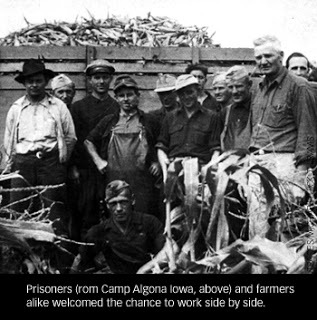 Photo courtesy of historynet.com
Photo courtesy of historynet.comDo not be overcome by evil, but overcome evil with good. – Romans 12:21 (NIV)
I was online checking out campgrounds in the Allegheny National Forest when I came across an interesting bit of information about the Red Bridge Campground near Bradford: “The recreation area is located near the site of a former Civilian Conservation Corps (CCC) unit known as Camp #3. The camp stood from 1933 until 1946. During World War II, it was used as a German Prisoner-of-War Camp.”*
What? A POW camp here in Pennsylvania?
My writer’s mind was intrigued. I researched further and learned that over 400,000 POWs, mostly German, were housed in close to 500 camps throughout the United States. Twenty-two POW camps were scattered throughout Pennsylvania, including in Kane, Marienville, and Sheffield in the Allegheny National Forest.
The United States abided by the terms of the Geneva Convention, so the prisoners were treated well. One prisoner gained more than 50 pounds during his stay. Less than 10-percent were hard-core Nazis, and there were few escape attempts.
They came at a time America was experiencing a severe shortage of labor—her men were overseas fighting the enemy. So the POWs were put to work—for pay, of course (the government receiving most of it)—on farms, in factories, and wherever they were needed. They built garages, harvested crops, stacked hay, cut timber. Some even sat at the dinner table with the families for whom they worked.
“Having a chance to be shoulder-to-shoulder with [the prisoners], you got to know them,” recalled Mel Luetchens, who was but a young boy on his family’s farm in Nebraska at the time. “They were people like us.”**
Yes, at first there was mistrust, but the arrangement worked. Lifetime friendships were forged. In my research, I read of POWs who fell in love, POWs who, after being sent back to their homeland after the war, returned to America to make new lives for themselves.
“Love your enemies,” Jesus commands us (Luke 6:35). “Do good to them.”
Is there anyone you see as an enemy? Perhaps “enemy” is a strong term. Maybe there’s someone who seems to thrive on making your life miserable. No matter how pleasant you are, you receive only hurtful remarks and treatment in return.
I once read of a woman—let’s say her name was Mary—who had a co-worker like this. So one day Mary showed up with a plate of homemade cookies, which she gave to her tormenter.
“Oh, how did you know chocolate chip cookies are my favorite?” the woman said.
The woman’s attitude improved, and the two became friends. Mary later learned the woman was going through a difficult time in her life.
You can play the one-upmanship game, but that will only lead to more and bigger hurt. Or you can refuse to retaliate. You just don’t know what that person is going through. Everyone, I’ve learned, has “stuff” they’re dealing with.
“When you know people as human beings up close and understand about their lives,” said Luetchens, “it really alters your view of people and the view of your own world.”
Help me, Lord, to treat others the way I want to be treated—no matter how badly they treat me. Fill my heart with Your love, compassion, and understanding. Amen.
More tea: Read Luke 6:27–36
Sources:
* http://www.alleghenysite.com/cabins/red-bridge
** http://www.smithsonianmag.com/history/german-pows-on-the-american-homefront-141009996/?no-ist=&page=1
May 30, 2015
Pretty but dangerous
 Vinca Minor
Vinca MinorFrom WikiMedia Commons
Be self-controlled and alert. Your enemy the devil prowls around like a roaring lion looking for someone to devour. –1 Peter 5:8 (NIV)
As my husband and I hike the trails of the great outdoors, we spot different forms of wildlife and plants. I especially love wildflowers, often stopping to examine tiny blooms and wishing I knew what they were.
But I’ve learned not all flowers are good for the environment.
Take periwinkle, for example. Those pretty, delicate blossoms can be downright dangerous to its surroundings. Also known as vinca minor, the quick-growing vine can take over an area, crowding out native vegetation and providing very little in terms of food and other habitat needs for native wildlife, such as insects and birds. Like other non-native invasive plants, vinca minor plays a major role in the decline of native plants—and wildlife dependent on them.
Spreading by its root system, vinca minor is hard to get rid of. It isn’t easy to pull up all the roots. It just takes a portion left in the ground for the persistent plant to reappear.
Who would have thought those innocent-looking flowers could be so dangerous?
 Photo by Janet Allen
Photo by Janet AllenStewardship Garden
That’s how temptation comes—appearing as something harmless, pretty, and beneficial. Something that will satisfy us physically, emotionally, and spiritually.
That’s how Satan tempted Eve to eat the fruit God specifically commanded them not to eat. “She saw that the tree was beautiful and its fruit looked delicious, and she wanted the wisdom it would give her. So she took some of the fruit and ate it. Then she gave some to her husband, who was with her, and he ate it, too” (Genesis 3:6 NLT).
The result was not what they expected. Where before they knew only good, they now knew evil. And because they knew evil, God did not want them to eat of the Tree of Life and live forever in their sinful state. So they were expelled from Eden.
They lost their innocence, their home, their easy way of life, and their relationship with God Almighty. No more walks in the garden with Him in the cool of the evening. No more tending to a beautiful, weed-free garden planted in just the right kind of soil just for them. No more looking at things with awe and wonder.
Sin had done its nasty job. Their perspective of the world, of life, and of themselves was forever tainted.
Satan hasn’t changed his tactics.

A song popular in 1977 concluded with these words: “It can’t be wrong if it feels so right.” Dangerous words. Because something can look and feel right and be so wrong—and change your life and the lives of those you love forever. Something good can be irretrievably lost.
Don’t be fooled. Be alert. Pray for wisdom and strength.
And the God of grace will give you what you need to fight and win (1 Corinthians 10:13).
When temptation comes my way, O Lord, give me the wisdom to recognize it for what it is and the strength to say no. Amen.
More tea: Read Genesis 3
To learn more about invasive plants in Pennsylvania, visit the following sites:
DCNR Invasive Species Site:
http://www.dcnr.state.pa.us/conservat...
http://www.dcnr.state.pa.us/forestry/plants/invasiveplants/
Plant Invaders of Mid-Atlantic Natural Areas, National Park Service: http://www.nps.gov/plants/alien/pubs/...
Invasive Plants Field and Reference Guide, U.S. Forest Service: http://na.fs.fed.us/pubs/misc/ip/ip_f...
May 23, 2015
My Mantra and My Man
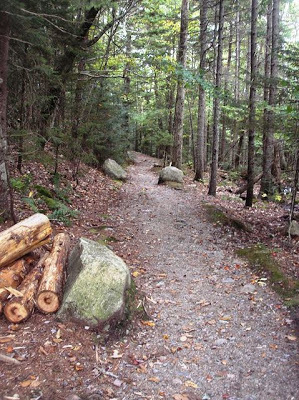 Trail to Beech Mountain Summit
Trail to Beech Mountain SummitAcadia National Park, Maine
September 2013I lift up my eyes to the hills—where does my help come from? My help comes from the LORD, the Maker of heaven and earth. – Psalm 121:1–2
Both hubby and I love the outdoors. Especially mountains, forests, streams, waterfalls, and wildlife. So camping and hiking have become activities we enjoy together during these empty nest years, although DH has more experience in walking in the woods and is more conditioned and stronger than I.
Over the past two years, we’ve trekked in the Finger Lakes region of New York, the Adirondacks, Maine, and North Carolina, in addition to trails here on the Huey homestead.
The trails at Taughannock Falls State Park were easy and short. At Fort Ticonderoga we walked 853 steep feet up Mount Defiance, where the elevation rose a foot and a half with each step we took. We stopped 11 times so I could catch my breath, Dean waiting patiently beside me.
Rocks, roots, and boulders marked the trails in Acadia National Park, which were longer and more challenging than the trails at Taughannock. “I can do this” became my mantra when the trail was rough, rocky, or steep, and when my body, mind, and spirit screamed with fatigue.
My mantra served me well when we hiked in the Great Smoky Mountains National Park. The trails there weren’t as rocky or as steep as those in Acadia, but they were long and steep enough to have me stopping to catch my breath every 50 steps, with Dean waiting beside me. I so appreciated his patience. He could have forged on ahead, at a much faster pace, but instead he waited until I was ready to move on and often took my backpack. He gave a whole new perspective to the term “long suffering.”
During the fourth mile of a 5-mile hike, my feet were dragging, my shoulders sagging, and my spirit flagging. “I can do this,” I muttered under my breath with every step. Dean slowed his pace to match mine and told me how well I’d done that day. I think he would have hauled me over his shoulder the rest of the way if I had asked.
This year we’re staying close to home. The Allegheny National Forest beckons us. The trails will still be challenging, but I’ll have my mantra and my man to see me through.
Hiking is a lot like life. You start out “slow and easy,” thinking you’re prepared, but you’re not. You meet with challenges, some so great you don’t think you can go on. You can’t plop down on the side of the trail and quit. Going back takes just as much as going forward. So after a brief rest stop, you push on. “I can do this,” you say.
Somewhere along the way, you realize you’re not alone. Someone stronger and wiser and more experienced is beside you. That’s when your mantra becomes “I can do all things through Christ who strengthens me” (Philippians 4:13).
With hiking and with life, I know I’ll stay the course—with my mantra and my Man, who waits patiently until I’m ready for the next step, carries my burden when it gets too heavy, and whispers tender words of encouragement.
Thank you, Lord, for walking beside me in this hike called life. Someday I will say, “I have fought the good fight, I have finished the race, I have kept the faith” (2 Timothy 4:7). Amen.
More tea: Read Psalm 121
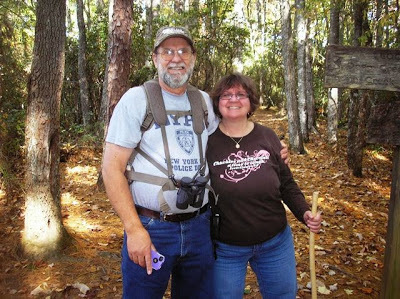 Dean and me
Dean and meGreat Smoky Mountains National Park (Bryson, NC)
October 2014
*************************
NEWS from Helping Hands Press:SPRING SUPER SALE

Right now until June 18th everything in the Helping Hands Press Store is 25% OFF!!!!!!When you checkout, please put the code word SpringSuperSale into the coupon area to receive the discount.Everything is on sale in the HHP Store: ALL audiobooks, ebooks, paperbacks and all pre-sale titles.We will be adding in as many of our ebooks on a daily basis as we can, so please check back often.Here is the direct link to the Helping Hands Press Store: http://shop.myhelpinghandspress.com/
How would you like to be able to listen to over 20 audiobook samples by going to just one place?
The audiobook genres cover everything from Fantasy and Sci-Fi to Devotionals and almost everything you can think of in between!
What do you have to do to get the link to go to this magical place?
Pretty simple: just fill out the “Contact Form” on the left sidebar of the HHP Blog and we will send you an invitation to enter.
May 16, 2015
The pages of my journal
 Trust in Him at all times. Pour out your heart to Him, for God is our refuge. – Psalm 62:8 (NLT)
Trust in Him at all times. Pour out your heart to Him, for God is our refuge. – Psalm 62:8 (NLT)Do you keep a spiritual journal?
I do.
On the pages of my journal is where I’m honest with myself about myself – my feelings, foibles, and fears. It’s where I come face-to-face with my wants, my weaknesses, and my wrestlings. Where I record my struggles with life. Where I pour out my mind and my heart as I strive to hear and understand God’s direction. Where I try to make sense of things that just don’t seem to make sense.
Here’s one entry from January 13, 2011. I’d had carpel tunnel surgery a month earlier, which did little to relieve the numbness in my left arm and hand. In fact, my condition worsened. “Inflamed nerve endings” was the diagnosis and the Rx was Tylenol with codeine. I’d never experienced such debilitating pain, and I hope I never do again. An MRI eventually revealed three herniated neck disks, for which I had surgery six months later.
In the midst of the pain, I wrote, “I never thought to pray myself for God to take away the pain and heal me. I’ve asked others to pray – for the neck to heal – but in its time. I don’t expect a miracle. Why? Because I believe that God is in control of my life, and that He has allowed this for a reason. There is a purpose for the pain.”
Then I skipped a space and wrote, “I’m almost 60. My body is slowing down.”
Nine months later, on September 12, I wrote:
“Today I begin my retirement from teaching. I am sad. Teaching is my passion, and I loved teaching at PCS. But I know at this time it’s the right decision. I’m weary in body, mind, and spirit. I must tend to all areas to get my life back in balance and to find renewal, restoration, and healing.
“I’m spending the morning feeding my soul (with reading and prayer). This first week I’m making a personal retreat to have time alone with God, not necessarily seeking His will, but seeking HIM. I will rest my body, which is exhausted. . . . Yes, I have responsibilities and obligations, but my first priority is restoring health in my body, spirit, and mind.”
I confess: I’ve been neglecting my spiritual journal. I’ve let my life get out of balance again.
It’s time to get back to recording my spiritual journey. For I need to pour out my heart to God, let Him help me make sense of the senseless, and come face-to-face with not only myself, but the God who loves me and guides me and is present with me every moment of every day.
You have a journal, too, Lord. It’s called the Bible. May I read it every day because on its pages You pour out Your love for me. Amen.
More tea: Read Psalm 62
God, Me, and a Cup of Tea
- Michele Huey's profile
- 19 followers



